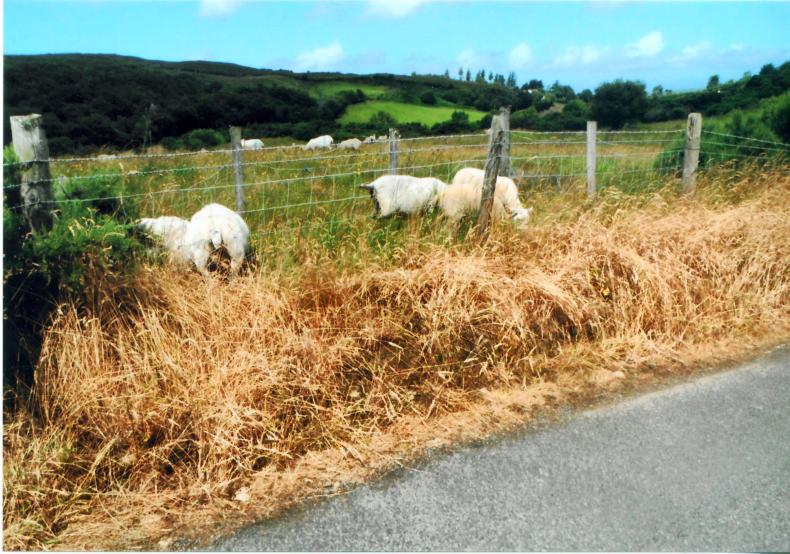The next meeting of the European Committee on phytopharmaceuticals tasked with deciding the future of glyphosate is scheduled to meet this Thursday and Friday, with two more possible sessions before the current authorisation of the chemical expires at the end of this year.
Experts nominated by 55% of EU member states representing 65% of the Union's population must give their agreement if glyphosate is to remain on the shelves. The European Commission has proposed a 10-year renewal.
'Phasing-out plan'
The French position has been key. After the country abstained in a previous vote last year, Nicolas Hulot, the environment minister appointed by France's new president Emmanuel Macron, said in August that Paris would vote no.
The French position has softened in recent days, however. While the government is still opposing a 10-year re-authorisation, it has signalled that a shorter period would be acceptable. On Wednesday, the agriculture and environment ministers were formally tasked with producing a "phasing-out plan for glyphosate" by the end of the year. "The government will then decide its position, which it will confront with those of the European Commission and other member states, to establish the conditions of a reasonable transition away from glyphosate," a statement from the Ministry of Agriculture read.
We cannot ban it overnight; that would be taking farmers hostage
Junior Environment Minister Sébastien Lecornu said: "We cannot renew it for 10 years, it is too long. But we cannot ban it overnight; that would be taking farmers hostage."
The statements followed activism on both sides of the French glyphosate debate. In the past week, farmers have lay down across the Champs-Elysées in Paris in protest against the proposed ban on glyphosate. Meanwhile, environmentalists teamed up with scientists at Paris Sud University to study the effect of glyphosate on mushrooms, showing that it could affect the activity of their individual cells without causing visible damage to the entire plant.
In his keynote speech on Europe this week, President Macron catered for both viewpoints. In a direct reference to glyphosate, he said: "We are having political debates that are sometimes trying to replace scientific debates. Science must expose dangers, but also independently and transparently point the way to scientifically proven alternatives." He also cautioned against both "political engagement" and "industrial interests" clouding scientific decisions.
German position
Germany also abstained in a previous vote and its position remains uncertain as negotiations continue between Chancellor Angela Merkel and potential coalition partners following last week's election. The Green Party is part of the talks and its participation in a coalition would influence the German position.
The French and German delays in reaching their final position means a decision on the re-authorisation of glyphosate is likely to be left until the last minute at the end of this year.
Read more
Glyphosate poses no risk to human health – new EFSA ruling
Over one million people sign petition to ban glyphosate
Full coverage: glyphosate
The next meeting of the European Committee on phytopharmaceuticals tasked with deciding the future of glyphosate is scheduled to meet this Thursday and Friday, with two more possible sessions before the current authorisation of the chemical expires at the end of this year.
Experts nominated by 55% of EU member states representing 65% of the Union's population must give their agreement if glyphosate is to remain on the shelves. The European Commission has proposed a 10-year renewal.
'Phasing-out plan'
The French position has been key. After the country abstained in a previous vote last year, Nicolas Hulot, the environment minister appointed by France's new president Emmanuel Macron, said in August that Paris would vote no.
The French position has softened in recent days, however. While the government is still opposing a 10-year re-authorisation, it has signalled that a shorter period would be acceptable. On Wednesday, the agriculture and environment ministers were formally tasked with producing a "phasing-out plan for glyphosate" by the end of the year. "The government will then decide its position, which it will confront with those of the European Commission and other member states, to establish the conditions of a reasonable transition away from glyphosate," a statement from the Ministry of Agriculture read.
We cannot ban it overnight; that would be taking farmers hostage
Junior Environment Minister Sébastien Lecornu said: "We cannot renew it for 10 years, it is too long. But we cannot ban it overnight; that would be taking farmers hostage."
The statements followed activism on both sides of the French glyphosate debate. In the past week, farmers have lay down across the Champs-Elysées in Paris in protest against the proposed ban on glyphosate. Meanwhile, environmentalists teamed up with scientists at Paris Sud University to study the effect of glyphosate on mushrooms, showing that it could affect the activity of their individual cells without causing visible damage to the entire plant.
In his keynote speech on Europe this week, President Macron catered for both viewpoints. In a direct reference to glyphosate, he said: "We are having political debates that are sometimes trying to replace scientific debates. Science must expose dangers, but also independently and transparently point the way to scientifically proven alternatives." He also cautioned against both "political engagement" and "industrial interests" clouding scientific decisions.
German position
Germany also abstained in a previous vote and its position remains uncertain as negotiations continue between Chancellor Angela Merkel and potential coalition partners following last week's election. The Green Party is part of the talks and its participation in a coalition would influence the German position.
The French and German delays in reaching their final position means a decision on the re-authorisation of glyphosate is likely to be left until the last minute at the end of this year.
Read more
Glyphosate poses no risk to human health – new EFSA ruling
Over one million people sign petition to ban glyphosate
Full coverage: glyphosate






 This is a subscriber-only article
This is a subscriber-only article










SHARING OPTIONS: